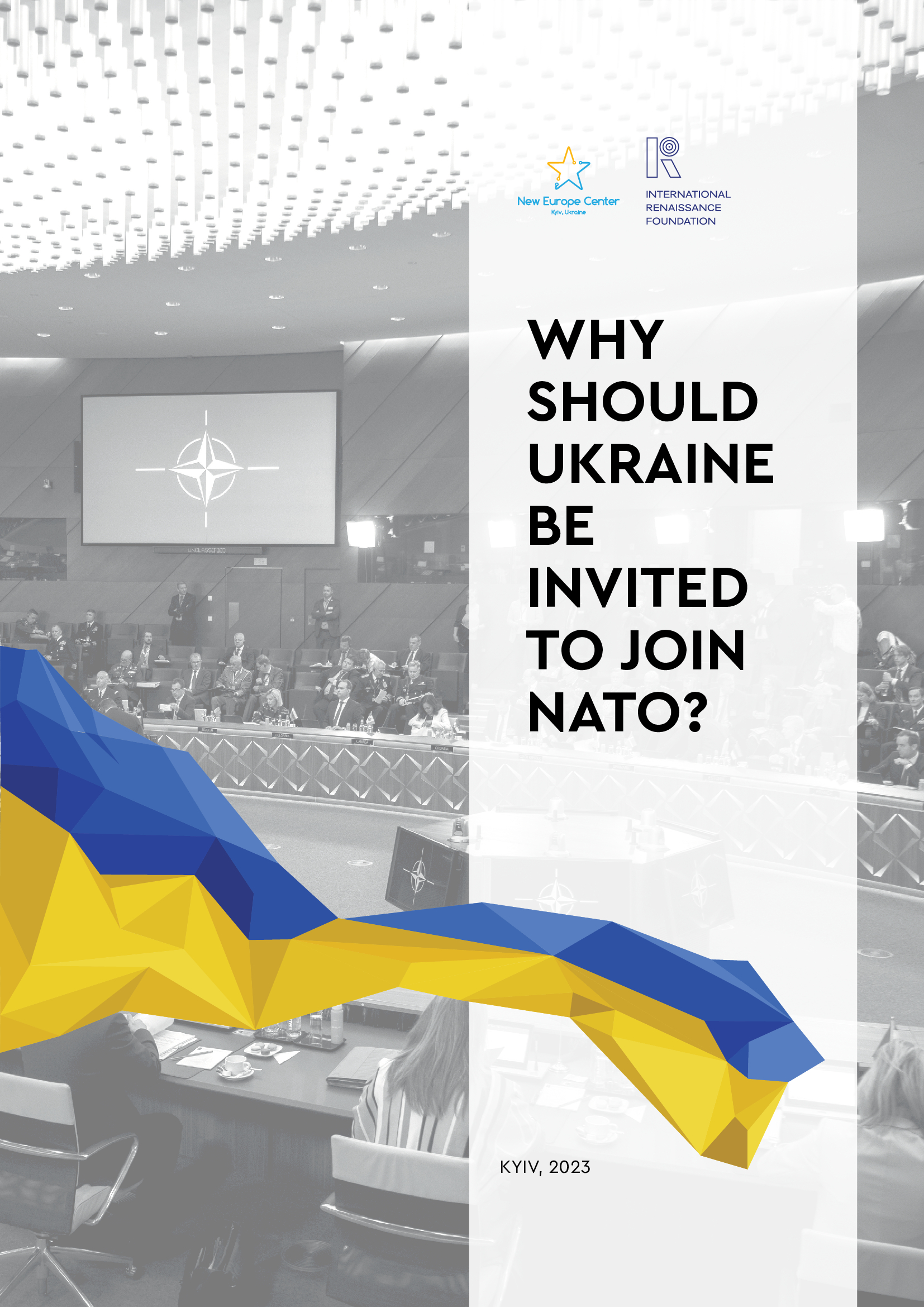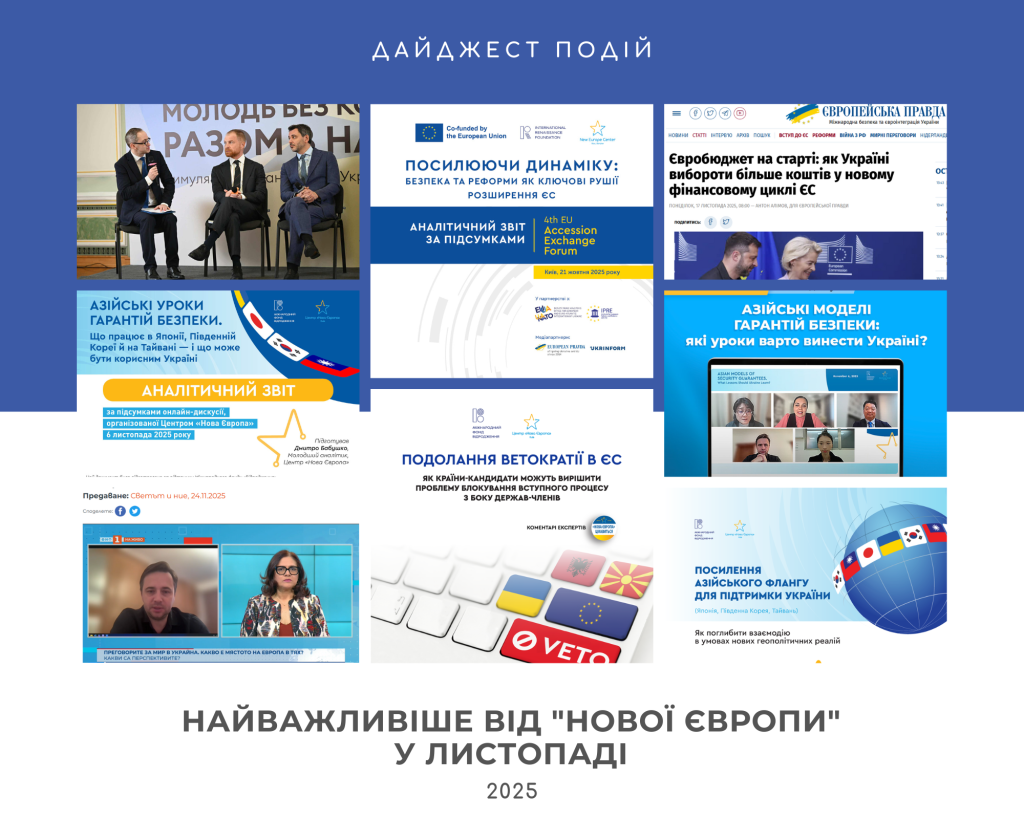
NATO member states have maintained the position since the 2008 Bucharest Summit that Ukraine will one day become a member of the Alliance. However, in practice, NATO continues to implement a policy of «strategic ambiguity.» Would Putin have dared to attack Ukraine if it had been a NATO member? This is extremely unlikely. NATO should correct the tragic mistake made in Bucharest and invite Ukraine to join the Alliance.
PART ONE
Ukraine in NATO is…
…the best guarantee against new wars
Ukrainian NATO membership would forever prevent Russia from considering a new invasion. Moscow will not dare risk a conflict with the much more powerful NATO Alliance.
…a step toward a stronger NATO
Ukraine joining NATO will greatly enhance the Alliance’s military capabilities. Ukraine’s army is the only force in Europe with experience of modern full-scale warfare against a significantly larger and more powerful enemy. As a new NATO member, Ukraine would become a reliable pillar of the Alliance’s eastern flank. Ukraine’s current absence from NATO significantly weakens the Alliance in Europe.
…essential for Ukraine’s reconstruction
Only NATO membership (or reliable bilateral security guarantees) can ensure Ukraine’s reconstruction. Lack of such security guarantees will significantly limit the number of international investors from democratic countries willing to bring best business practices to Ukraine.
...financially attractive for NATO members
Ukrainian membership of NATO would be far more cost-effective than the financial and military aid packages that member states have been providing over the past year and are committed to continue providing “for as long as it takes.”
…a catalyst for Russia’s democratic transformation
In order to achieve a genuine democratic transformation, Russian society must first abandon dreams of restoring the old empire. Ukraine’s accession to NATO is the fastest way to bury this dream.
…a powerful symbol of the values NATO represents
A positive decision on Ukrainian membership would dramatically enhance NATO’s image as an Alliance that defends its core values while demonstrating the ability of its member states to make historic political decisions.
PART TWO
Why should Ukraine be invited to join NATO?
Inviting Ukraine to join NATO would accelerate the end of the war. Ukrainian NATO membership would be a decisive geopolitical step indicating that Ukraine will never again be part of the “Russian Empire” in any of its possible incarnations. The current policy of “strategic ambiguity” regarding Ukraine’s future NATO membership motivates Russia to attack Ukraine in order to keep it within its sphere of influence.
There is no need to fear escalation because Putin himself has no stomach for a confrontation with NATO. Nobody is more reluctant to escalate Russia’s war against Ukraine into World War III than Vladimir Putin. The Russian army has no chance in a military confrontation with NATO and is barely coping with the Armed Forces of Ukraine. Putin knows this and will do everything to avoid a direct conflict with NATO.
There are no restrictions on inviting new members during wartime. The only thing needed in order to offer Ukraine NATO membership is the political will of NATO member states. There is no strict list of criteria for inviting new countries, nor are there any formal restrictions on inviting countries to join during wartime. According to the 1995 Study on NATO Enlargement, the decision to invite a particular country to join the Alliance is made on a case-by-case basis.
An invitation to join NATO does not mean immediate accession. Even in the case of Finland’s record-breaking NATO accession, the process still took nearly a year. Inviting Ukraine to join NATO does not imply instant accession and would not immediately oblige existing members to defend Ukraine by invoking Article 5 of the Washington Treaty.
Ukraine has already achieved a completely new level of interoperability with NATO. The level of interoperability between Ukrainian and NATO forces today cannot be compared the situation before the start of the full-scale war in February 2022 (not to mention the level of interoperability at the time of the NATO Bucharest summit). Ukraine’s transition to NATO principles and standards, as well as to the armaments of the Alliance, is taking place at an accelerated pace.
Ukraine has proven that it can become a pillar of NATO’s eastern flank. With its professionalism and proven readiness to defend not only Ukraine but also Europe as a whole, Ukraine has demonstrated that it can become a pillar of NATO’s eastern flank. Moreover, it can critically weaken NATO’s main adversary (Russia is defined as ‘the most significant threat’ in the NATO Strategic Concept). The role of the Ukrainian army in the defense of the European continent will only increase, especially with the United States reorienting its focus from Europe to Asia.
Public opinion in NATO member states backs Ukrainian membership. A poll conducted by Kantar on behalf of the New Europe Center reveals that 70% of Americans, 55% of Dutch, 53% of Italians, 56% of French, and 50% of Germans who expressed an opinion support the idea of a NATO invitation for Ukraine already at Vilnius NATO summit. Meanwhile, the number of respondents who opposed an invitation was striking low. As a union of democracies, the Alliance must heed the voice of its citizens.
NATO membership unites Ukrainians. The idea of future NATO membership enjoys overwhelming support in every region of Ukraine and unites the entire country. A record 82% of Ukrainians support Ukraine’s membership in NATO, including 80% in the south and 72% in the east.
Joining NATO will boost Ukrainian morale and demoralize the Russian army. Inviting Ukraine to join NATO during the coming critical counteroffensive will significantly strengthen the morale of Ukrainians while reducing the motivation of Russian military personnel. This could lead to an increase in surrenders or desertions.
Inviting Ukraine to join NATO sends a signal to investors. Ukraine’s future membership in the Alliance will serve as an important signal to investors who are considering participating in Ukraine’s post-war reconstruction but remain concerned about security risks.
Joining NATO is a powerful signal to millions of Ukrainian refugees. It shows that they can return safely to Ukraine and it provides a powerful impetus to plan their future lives in their homeland.
EU membership helps drive reforms but cannot provide security. Article 42.7 of the EU Treaty cannot replace Article 5 of the NATO Washington Treaty. Not only does the process of Ukraine’s accession to the EU require significantly more time than accession to NATO, but there is also a big question about what Article 42.7 fundamentally provides in terms of security guarantees. Sweden and Finland’s recent decision to pursue NATO membership is the most eloquent confirmation of this.
PART THREE
What will it mean if Ukraine is not invited to join NATO?
– Russia will de facto retain the right to veto the process of NATO enlargement and will receive confirmation that its policy of waging wars and occupying other countries to prevent them from integrating into NATO is effective.
– As long as Ukraine is not officially invited to join NATO, Putin remains motivated to attack Ukraine again and again with the hope of creating a new Russian Empire.
– Failure to offer Ukraine NATO membership indicates a lack of faith not only in Ukraine’s ability to regain control over its internationally recognized borders, but also in Ukraine’s ability to survive as a sovereign state. Even if certain territories remain occupied for some time, a solution can be found regarding the application of Article 5. This has been done previously in relation to existing NATO members such as US territories Hawaii and Guam or the UK’s Falkland Islands.
– Not inviting Ukraine for membership might disrupt unity among NATO member states: Eastern European countries perceiving Ukraine`s membership as a guarantee for their own security might be tempted to create a new mini-aliance of their own, alongside NATO.
– NATO member states will send a signal to the Kremlin that they view Ukrainian NATO membership as a bargaining chip in possible future negotiations by ignoring position of Ukrainian society.
– The reform of democratic civilian control of the Ukrainian Armed Forces, as well as other reforms related to Ukraine’s NATO ambitions, will be stalled.
– The Alliance will be discredited in the eyes of Ukrainian society, as well as among citizens of NATO member states who support inviting Ukraine to join the Alliance.
– Refusal will send a signal to investors potentially interested in participating in Ukraine’s reconstruction that security risks remain high and NATO is not currently ready to address this issue.
Full memo is aviable here
The material prepared with the support of the International Renaissance Foundation. The material reflects the position of the authors and does not necessarily coincide with the position of the International Renaissance Foundation.














